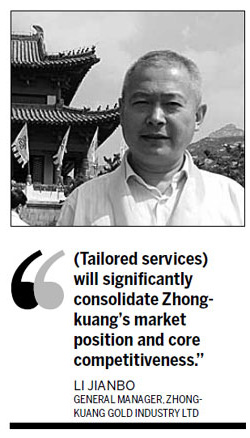All that glisters is no longer gold in Zhaoyuan
Updated : 2013-10-21
By Zhong Nan and Zhao Ruixue (China Daily)
"That avoids financial risks, complex entry conditions and labor rules in unfamiliar gold production countries such as Australia, Brazil, Ghana and Mongolia," Lu says.

By the end of last year, the company had set up more than 26 branches to offer a comprehensive range of services such as technical, management and cost-saving solutions across China, including six wholly owned and joint venture gold mines under state supervision in Gansu, Qinghai and Shaanxi provinces, and in Inner Mongolia and Xinjiang Uygur autonomous regions.
The company says that last year it found new gold reserves of 223 tons and produced 3.5 tons.
Gold has been in hot demand in China since mid-April, when Chinese people, many of them middle-aged housewives, started a run on jewelry store supplies, buying large quantities as prices slumped, triggered mainly by Cyprus, in the throes of a debt crisis, selling its gold reserves.
Lu says the falling price has put extra pressure on Zhaoyuan's miners because profits on gold bars, Zhaoyuan's staple product, are linked to international prices.
Gold futures on the Comex division of the New York Mercantile Exchange dived to $1,200 an ounce, approaching a three-year low, before the third quarter of this year and, earlier this month, it was at $1,300 an ounce on the back of worries of a debt default in the US. In January the Comex price had been between $1,630 and $1,680 an ounce.
Lu says: "Since the beginning of the second half, we have been busy responding to this drawback by diversifying the business focus to further develop better value-added products, because producing more gold products such as gold commemorative coins, necklaces, rings, bracelets, ornaments and artworks can help add to the group's revenue."
Chinese people have always been fond of jewelry, particularly gold and diamonds, seeing them as a safe investment.
"Once the jewelry market starts booming, it is easy for it to become a consumption trend," says Zhang Yongtao, vice-chairman of the China Gold Association in Beijing.
Zhaojin Group had revenue of 40.3 billion yuan last year, half of it from the company's gold and related businesses. Lu says the company plans to build a jewelry park in Zhaoyuan next year, including a production plant, a regional distribution center and other support facilities. The park is expected to be open by 2016.
Li Jianbo, general manager of Zhongkuang Gold Industry Ltd, another large gold mining business in Zhaoyuan, says gold companies in the city should focus on tailored products and services for banks, other companies and wealthy individuals to boost sales, because gold bars are unlikely to draw higher returns amid slow global economic recovery.
China Construction Bank and Industrial and Commercial Bank of China are two of Zhongkuang's biggest customers, but Li believes the company needs to snap up business with other big companies, jewelry retailers and rich individuals before its rivals do so.
